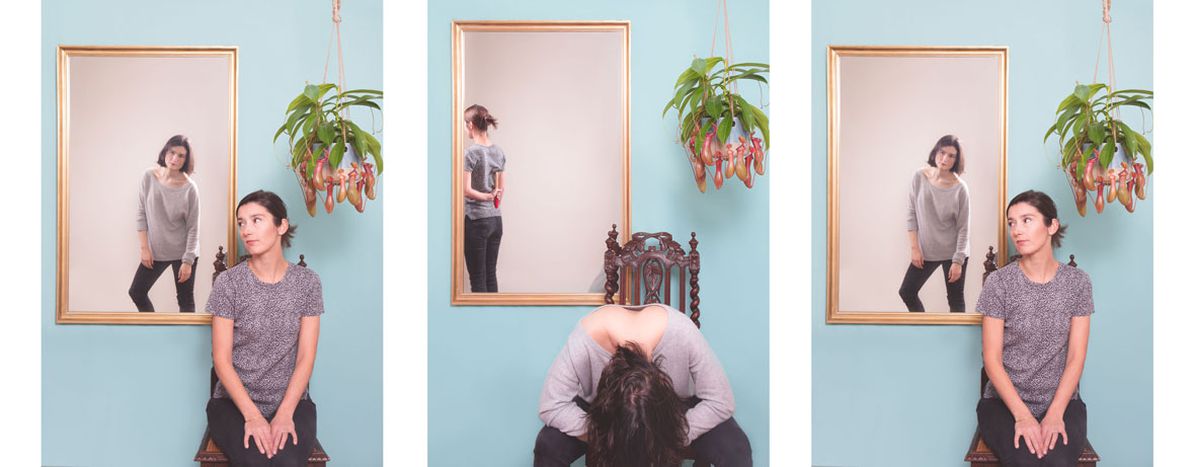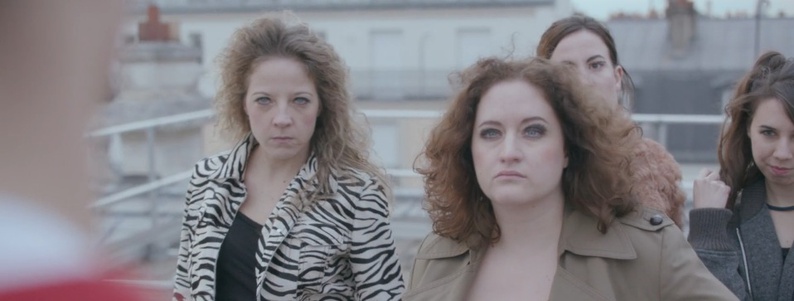
"La Bombe" or how to overturn rape stereotypes
Published on
Translation by:
Sacha SibadeWritten with a rush of blood to the head, ZOU's song "La Bombe" (The Bomb) is a rare artistic testimonial about rape. Four years later, the French singer who lives between Paris and Berlin chose to illustrate it with a 6-minute music video. But what can you show when you're talking about rape? An explosive interview.
Borderline ad campaigns, repetitive sexual agressions found sprinkled in pop-culture, free legal passes for rapists... let's add the trivialisation of violence to women's bodies, which are already sexualised. Even if its means flirting with glamorisation. But what would happen if the roles were reversed? What would the public say if Ramsay had to suffer Sansa's assaults? ZOU seems to have thought about it long and hard: "Unfortunately, this is the way we work. If we don't identify with something, if it's not close to us, we're not interested." The French artist that relocated to Berlin wrote "La Bombe" as a means to voice her anger for gender violence. Four years later she co-directed the music video, which was later nominated for the Berlin Music Video Awards. The video played with and reversed the established codes to offer an atypical view on sexual violence. The result: it pokes you where it hurts. Here's an interview with a woman as talented with words as she is with images.
Can you tell us more about the origin of this project?
ZOU: I wrote the song “La Bombe” four years ago. I was inspired by personal experiences that resonated with what I was seeing on the screens, in magazines, etc. The idea of playing out a rape scene only came later. For me, that work hypothesis is symbolic: it transcribes what I express in the song while going even further at the same time. My artistic direction was supported by what I was seeing all around me. I wanted to show the violence in human relations and focus on the power/responsibility of the media. "La Bombe" is a rebellion, a criticism in its rawest form on the normalisation of violence. It's the use of crude words in the mouth of a female artist, pointed at close range on a young man's temple. I gave birth to "La Bombe" in a savage way. I was very angry. After that, I matured the concept through discussions, lectures and screenings.
Why “La Bombe”?
ZOU: There’s this idea of explosion, of war, of projections, but also of canons of beauty. It’s paradoxical and ambiguous, as everything around the subject of rape is. In “La Bombe”, there’s this idea of a break-up: breaking up with the known social patterns. We looked for a way to give men the possibility to identify with the victim and for women to identify with the perpetrator. Surprisingly (or not) it’s more difficult to find an actor who’s got the nerve to play the part of Jim, than to find an actress to play the part of a rape victim.
On the other hand, I’ve had very positive reviews from the masculine audience and more complicated, disparate ones from women. We’re showered with very cute women being raped in cinemas, with deeply misogynistic music videos. And it’s always the same pattern; it’s becoming the norm. The idea behind “La Bombe” is to change the referent to realise that it is not normal; rape is not sexy. Of course, to do that we also heavily played on the actor Cyril Crampon’s sex appeal, in a way that shows how problematic this is. Eroticising rape is dramatic. With that plot twist – roles being reversed – we implicitly give rape its horrific nature back. In the lyrics, I refer to my family members as to condemn rape by association and by playing on our capacity to feel compassion for others. If I don’t want it to happen to my brother, then I don’t want it to happen to men, to women, etc. Out of sight, out of mind. Well, in the end we’re putting it back in sight to get your mind thinking.
The video was shot in a beautiful place in Paris…
ZOU: Yes, we shot on the Sorbonne’s rooftop. It was important to me that we settled in an exceptional background to get out of the clichés and stereotypes of rape, which keeps us from thinking. Furthermore, we wanted to get out of the overused settings like the dark alley or the sketchy suburbs. In a way, we played with the familiarity and the exceptional traits of the place. A rooftop that looks over the city, it takes us out of time, of the everyday space, of reality. That way, we tried to keep our distance with history. The Pantheon-Sorbonne university, it’s also an emblematic place for me. We’re right in the heart of Paris, in the quartier Latin, a stone's throw away from the Pantheon, of the Sainte-Geneviève library, etc. Yet, even the people who have access to all this still dare to hurt others. Rapes, organised rapes in parties… There are stories like that nearly every year in business schools, plenty of facts that are silenced by the school's administrations not to tarnish their reputation. Stories that we don’t talk about out loud, that we do not name, but that really are rapes. […] With "La Bombe", we talk to the elite about its taboo subjects.
 As you said, we’re used to seeing 'conventional' rape scenes. But here, the fact that it’s a man – and the fact that nothing's really shown – it was really disturbing to watch…
As you said, we’re used to seeing 'conventional' rape scenes. But here, the fact that it’s a man – and the fact that nothing's really shown – it was really disturbing to watch…
ZOU: Cool! For me, it was an experience. I didn’t know if it was going to work. Indeed, we don’t show that much, it was important for us to play on ambiguity. With the dreamy background, the soft light, the good looking actor, there’s a kind of romanticism that emerges. Nonetheless, it is a rape. We wanted to take on the pastiche to the very end and in that way, get into the drama. It’s "La Bombe's" originality. Reversing roles is nothing new, but to do it seriously, I had never seen it. And that’s why we did it! There is a real problem in how rape is treated. For instance, in Irréversible [NB. 2002 movie by Gaspar Noé], the rape scene is very trashy but still erotic at the same time. And eroticising is the real problem […] But one thing is for certain, rape is a plague in our society. And regarding this, artists and media outlets have a responsibility […] Lots of artists use sex and misogynistic statements with economic and newsworthy goals, only to create a hype. It’s a selfish choice that is excused by a whole side of today's artistic world.
You live in Berlin and you shot the music video in Paris. Do you notice differences between the two countries on gender equality?
ZOU: When I arrived in Germany, I thought the environment was great; much more egalitarian than France. There’s a more pragmatic side, it seems more structured. In the streets you don’t get cat-called. Then I worked in a production company that was very well-established on the national and European market: barely 5% of the directors were women. Oops! Should I change career? The glass ceiling is present here too. You see it less at first, but it’s still present.
I decided to shoot in Paris because that’s where I was living when I wrote the song and I sing in French. It was more coherent than to shoot it in Berlin.
---
This article was originally published in Girlshood, a webzine for unconventional girls.
Translated from « La Bombe » ou comment renverser les codes du viol



